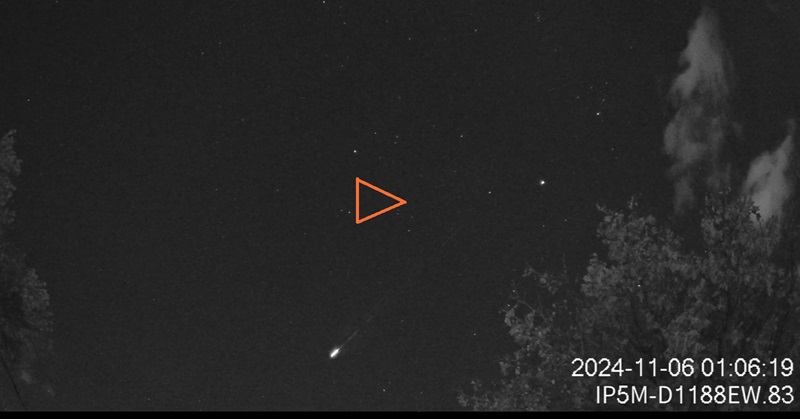Yearly Meteor Showers
Meteor video by MAS member, Joe Lopina, taken from West Allis. The bright "star" in Taurus is Jupiter.
|
Dates |
Maximum Date(s) |
Shower Name |
| Jan 1-5 | Jan 3-4 | Quadrantids |
| Jan 15 - Feb 8 | Jan 27-28 | Alpha Aurigids |
| Apr 19-24 | Apr 22 | April Lyrids |
| May 1-12 | May 5 | Eta Aquarids |
| Jun 10-21 | Jun 15 | June Lyrids |
| Jul 15 - Aug 15 | Jul 28 | Delta Aquarids |
| Aug 1-18 | Aug 12 | Perseids |
| Oct 17-26 | Oct 20 | Orionids |
| Nov 14-20 | Nov 17 | Leonids |
| Dec 4-16 | Dec 13-14 | Geminids |
How to observe a meteor shower
- Shower is a terrible misnomer: Never expect a "shower."
The peak of most of the best showers is maybe 50 per hour with 100 per hour
the best. So with maybe 1-2 meteors per minute it's no more of a drizzle.
For the general public you should ignore most of the so-called showers. The two we recommend, however, are the Perseids which peak on August 12th and the Geminids which peak on December 13th and 14th.
- Instrumentation: The great news about a meteor
shower is that it requires nothing more than just your eyes. Meteors
appear so suddenly and move so fast that even seeing them in binoculars
is out of the question. You simply need to just look up into the sky with just your
eyes. Consequently, we suggest lying on your back on a comfortable lounge chair.
- Location: What you need is a relatively dark
location (i.e., try to get as far out of the city as practical) because
the darker the skies, the more meteors you'll see. Also, a site with
relatively good horizons helps because the meteors can appear in any
part of the sky.
- When to observe: The table gives the dates
when you are more likely to see meteors and the best nights are those
marked as the peak. But during those dates, the best time is generally
after midnight.
- Avoid the Moon: Along the lines of a
dark sky, the presence of the moon will always be a hindrance. So pick a
time when the moon is not out. Unfortunately, if the meteor shower
occurs near the full moon, there's nothing you can do but wait for
another shower.
- Dress Warm: The best advice we can offer is to dress warm. Nothing can spoil the fun like getting cold. Unfortunately, the Geminids which is usually the best meteor shower of the year occurs in the middle of December so few people really go out for that one.
For more information, we have a page about meteors in our Beginner's Guide. We also suggest reading EarthSky's Top-10 Tips For Meteor Watchers.
Meteor Radiants - Current Activity
